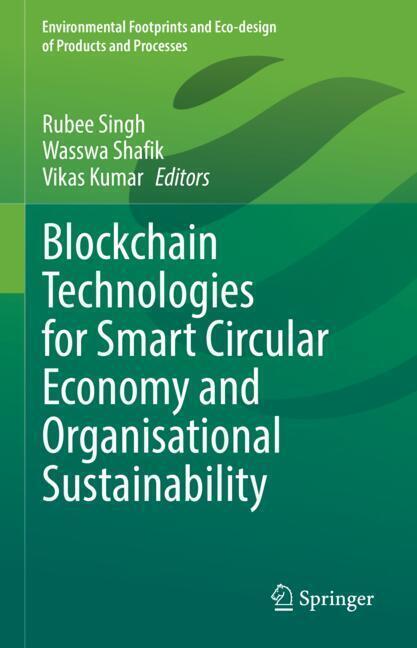
Zustellung: Fr, 01.08. - Do, 07.08.
Versand in 5 Wochen
VersandkostenfreiBestellen & in Filiale abholen:
This book provides a descriptive overview of blockchain technology domain, we observe a transformative influence that has surpassed its initial application in Bitcoin and has permeated nearly all industries. The utilisation of distributed ledger technology presents a significant transformation in the realm of data management, trust, and transparency. Its impact extends beyond financial transactions and encompasses other domains like supply chain optimization, identity verification, and the development of decentralized apps. The process of transformation has been initiated in various industries, including finance, healthcare, and logistics.
In contrast, there is a notable increase in the adoption of the smart circular economy frameworks as a response to the heightened acknowledgment of the environmental and resource-related obstacles linked to the traditional linear paradigm of "extract, produce, discard." The primary objective of the circular economy is to limit the generation of waste, advance sustainable product design, and promote responsible resource utilization through the facilitation of recycling, remanufacturing, and the prolongation of product lifespans. This movement holds significance for various industries, including manufacturing, waste management, and sustainable consumerism, due to its wide-ranging ramifications.
Its unique characteristic is its capacity to connect these two realms, emphasizing the potential of blockchain technology in facilitating transparent data management and smart contracts to advance the concepts of the circular economy. The book offers a thorough examination of the topic, offering readers a grasp of the fundamental principles of blockchain as well as the dynamic field of sustainability. This renders it an indispensable reference for individuals interested in the interdisciplinary ramifications of technology on sustainability, and the transformative possibilities of blockchain within the realm of resource-efficient and environmentally conscious approaches. The book exemplifies a progressive perspective by demonstrating the significant role that inventive technology can assume in tackling the urgent issues of our era, revolutionising sectors, and influencing the trajectory of a more circular and environmentally conscious global society.
Inhaltsverzeichnis
Chapter 1: Integrating Sustainable HRM Practices to Enhance Environmental Performance in the Digital Circular Economy. - Chapter 2: Sustainable Finance and Green Investments: The Role of Blockchain, Circular Economy. - Chapter 3: Blockchain-Enabled Strategies for Sustainable Business and Organisational Growth. - Chapter 4: Navigating the Future and Integration of Blockchain and Smart Circular Economy. - Chapter 5: Leveraging Blockchain Applications for Corporate Social Responsibility (CSR) Towards Circular Economy: A Review. - Chapter 6: Harnessing Blockchain Technology in Renewable Energy Systems: A Path to Organizational Sustainability. - Chapter 7: Blockchain for Sustainable Waste Management: Transforming Recycling and Circular Economy Practices. - Chapter 8: Blockchain Technology and the Circular Economy: Applications and Opportunities in Supply Chain Management. - Chapter 9: Unveiling Blockchain Technology Dynamics: Empowering Future Generations to Build a Resilient UAE Circular Economy. - Chapter 10: Blockchain Technology and Its Impact on Circular Economy: Real-World Use Cases and Future Potential. - Chapter 11: Blockchain-Enabled Smart Circular Economy: Strategies for Sustainable Organizational Practices. - Chapter 12: Enhancing Supply Chain Transparency and Traceability in Waste Management Practices through Blockchain Technologies and Digital Innovations. - Chapter 13: Blockchain and the Smart Circular Economy: Real-World Applications and Insight. - Chapter 14: Leveraging Blockchain Technology and Smart Circular Economy: Synergies and Challenges for Developing Countries. - Chapter 15: Sustainable Product Life Cycle Management for Smart Circular Economy and Organisational Sustainability. - Chapter 16: Blockchain for Sustainable Finance and Green Investments in the Era of Sustainability. - Chapter 17: Empowering a Sustainable Future: Blockchain s Role in Economy, Organizations and Finance towards Smart Circular Economy. - Chapter 18: Tokenization in Blockchain Technologies: Enabling Smart Circular Economy and Organizational Sustainability.
Produktdetails
Erscheinungsdatum
01. August 2025
Sprache
englisch
Seitenanzahl
285
Reihe
Environmental Footprints and Eco-design of Products and Processes
Herausgegeben von
Rubee Singh, Wasswa Shafik, Vikas Kumar
Verlag/Hersteller
Produktart
gebunden
Abbildungen
VIII, 285 p. 7 illus., 6 illus. in color.
ISBN
9783031891823
Entdecken Sie mehr
Bewertungen
0 Bewertungen
Es wurden noch keine Bewertungen abgegeben. Schreiben Sie die erste Bewertung zu "Blockchain Technologies for Smart Circular Economy and Organisational Sustainability" und helfen Sie damit anderen bei der Kaufentscheidung.









